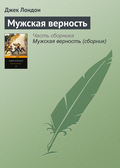
Джек Лондон
Мартин Иден / Martin Eden (+ аудиоприложение LECTA)
Chapter 7
A week of heavy reading had passed since the evening he first met Ruth Morse, and still he dared not call. He did not know the proper time to call, and he was afraid of a blunder. He left his old companions, and has no new companions. Nothing remained for him but to read, and long hours he devoted to it. But his eyes were strong, and they were placed on a strong body.
It seemed to him, by the end of the week, that he had lived centuries, so far behind was the old life. He attempted to read books that required years of studying. One day he read a book of philosophy, and the next day one that was ultra-modern. It was the same with the economists. On the one shelf at the library he found Karl Marx, Ricardo, Adam Smith, and Mill.
Poetry, however, was his solace, and he read much of it, finding his greatest joy in the simpler poets, whom he could understand. He loved beauty, and there he found beauty. Poetry, like music, touched him profoundly. The pages of his mind were blank, so he was soon able to extract great joy from chanting aloud. He enjoyed music and the beauty of the printed words he had read.
The man at the desk in the library had seen Martin there so often that he had become quite cordial, always greeting him with a smile and a nod when he entered. One day Martin asked him:
“Well, there’s something I’d like to ask you.”
The man smiled and paid attention.
“When you meet a young lady and she asks you to come, how soon can you come?”
“Why, any time,” the man answered.
“Yes, but this is different,” Martin objected. “She – I – well, you see, it’s this way: maybe she won’t be there. She goes to the university.”
“Then come again.”
“If I could …,” he said.
“I beg pardon?”
“What is the best time to come? The afternoon? Or the evening? Or Sunday?”
“I’ll tell you,” the librarian said with a brightening face. “You call her up on the telephone and find out.”
“I’ll do it,” he said, picking up his books and starting away.
He turned back and asked:
“When you’re speaking to a young lady – say, for instance, Miss Lizzie Smith – do you say ‘Miss Lizzie’? or ‘Miss Smith’?”
“Say ‘Miss Smith,’” the librarian stated authoritatively. “Say ‘Miss Smith’ always – until you come to know her better.”
So it was that Martin Eden solved the problem.
“Please, come any time; I’ll be at home all afternoon,” was Ruth’s reply over the telephone to his request as to when he could return the borrowed books.
She met him at the door herself, and her woman’s eyes noticed the certain slight but indefinable change in him for the better. Also, she was struck by his face. She felt the desire to lean toward him for warmth.
Once they were seated in the living-room, they talked first of the borrowed books, of Swinburne, and of Browning. Ruth wanted to help him. His neck was near, and there was sweetness in the thought of laying her hands upon it. She did not dream that the feeling he excited in her was love. She thought she was merely interested in him as an unusual type.
She did not know she desired him; but with him it was different. He knew that he loved her, and he desired her as he had never before desired anything in his life. He had loved poetry for its beauty; but since he met her the gates to the vast field of love-poetry had been opened wide.
His gaze wandered often toward her lips, and he yearned for them hungrily. But there was nothing gross or earthly in it. They were lips of pure spirit, and his desire for them seemed absolutely different from the desire that had led him to other women’s lips. He did not dream how ardent and masculine his gaze was, her spirit was affecting him. Her virginity exalted and disguised his own emotions, elevating his thoughts to a chastity.
“I wonder if I can get some advice from you,” he began. “You remember I said I couldn’t talk about books and other things because I didn’t know how? Well, I’ve done a lot of things ever since. I never had any advantages. I’ve worked hard ever since I was a kid. I was never inside a house like this. When I come a week ago, and saw all this, and you, and your mother, and brothers, and everything – well, I liked it. I’d heard about such things and read about such things in some of the books, and when I looked around at your house, why, the books come true. And I liked it. I wanted it. I want it now. I want to breathe air like you get in this house – air that is filled with books, and pictures, and beautiful things, where people talk in low voices and are clean, and their thoughts are clean. When you were crossing the room to kiss your mother, I thought it was the most beautiful thing I ever seen. I’ve seen a lot of things in my life, but I want to see more.
But listen, here it is. I want to enter the kind of life you have in this house. There’s more in life than drinking, and hard work. Now, how to begin? I can make most men sick when it comes to hard work. Once I get started, I’ll work night and day. Maybe you think it’s funny, when I ask you about all this. I know you’re the last person in the world I ought to ask, but I don’t know anybody else I could ask – unless it’s Arthur. Maybe I must ask him. If I was – ”
His voice died away. Ruth did not speak immediately. She had never looked in eyes that expressed greater power. Here was a man who could do anything. Her face was all sympathy when she began to speak.
“What you need, you realize yourself, and it is education. You should go back and finish grammar school, and then go through to high school and university.”
“But that takes money,” he interrupted.
“Oh!” she cried. “I had not thought of that. But then you have relatives, somebody who could assist you?”
He shook his head.
“My father and mother are dead. I have two sisters, one married, and the other’ll get married soon, I suppose. I have brothers, – I’m the youngest, – but they never helped anybody. The oldest died in India. Two are in South Africa now, and another is travelling with a circus – he does trapeze work. All what I want to know is where to begin.”
“I should say the first thing of all is the grammar. Your grammar is – ” She wanted to say “awful,” but she finished, “is not particularly good.”
He flushed and sweated.
“I know I talk a lot of slang and words you don’t understand. But then they’re the only words I know – how to speak. I’ve got other words in my mind, I found them from books, but I can’t pronounce them, so I don’t use them.”
“It isn’t what you say, so much as how you say it. I can be frank, can’t I? I don’t want to hurt you.”
“No, no,” he cried, while he secretly blessed her for her kindness. “‘You was right! I want to know these things from you than from anybody else.”
“Well, then, you say, ‘You was’; it is not correct. You must say, ‘You were.’ You often say ‘I seen’ instead of ‘I saw.’ You use the double negative – ”
“What’s the double negative?” he demanded; then added humbly, “You see, I don’t even understand your explanations.”
“I’m afraid I didn’t explain that,” she smiled. “A double negative is – let me see – well, you say, ‘never helped nobody.’ ‘Never’ is a negative. ‘Nobody’ is another negative. It is a rule that two negatives make a positive. ‘Never helped nobody’ means that they helped somebody.”
“That’s pretty clear,” he said. “I never thought of it before. I never thought of it before, and I’ll never say it again.”
She was pleased and surprised with the quickness and surety of his mind.
“You’ll find it all in the grammar,” she went on. “There’s something else I noticed in your speech.”
Martin flushed again.
“You say ‘ben’ for ‘been,’” she continued; “‘come’ for ‘came’; and the way you chop your endings is something dreadful.”
“How do you mean?” He leaned forward. “How do I chop?”
“You don’t complete the endings. ‘A-n-d’ spells ‘and.’ You pronounce it ‘an’. ‘I-n-g’ spells ‘ing.’ Sometimes you pronounce it ‘ing’ and sometimes you leave off the ‘g.’ ‘T-h-e-m’ spells ‘them.’ You pronounce it – oh, well, what you need is the grammar. I’ll get one and show you how to begin.”
She arose, and he stood up awkwardly, worrying as to whether he was doing the right thing.
When she returned with the grammar, she sat down beside him. She turned the pages of the grammar, and their heads were inclined toward each other. He could scarcely breathe, and his heart was pounding the blood up into his throat and suffocating him.
Chapter 8
Several weeks went by, during which Martin Eden studied his grammar, and reviewed the books on etiquette. He forgot about his friends. The girls of the Lotus Club wondered what had become of him and worried everybody with questions. Martin made another discovery in the library. He found books that helped him to learn metre and construction and form.
During those several weeks he saw Ruth six times, and each time was an inspiration. She helped him with his English, corrected his pronunciation, and started him on arithmetic. But their intercourse was not all devoted to elementary study. They were talking about the last poetry he had read, the latest poet she had studied. And when she read aloud to him her favorite passages, he delighted a lot. Never, in all the women, had he heard a voice like hers. The least sound of it was a stimulus to his love, and he thrilled and throbbed with every word she uttered.
The situation was obscured to Ruth. She had never had any experiences of the heart. Her knowledge of love was purely theoretical, her idea of love was not clear. She did not dream of the volcanic convulsions of love. She knew neither her own powers, nor the powers of the world; and the deeps of life were to her seas of illusion.
Strength! Strength was what she needed, and he gave it to her in generous measure. To come into the same room with him, or to meet him at the door, was to take heart of life. And when he had gone, she returned to her books with fresh store of energy.
Her interest in Martin increased, and she wanted to rebuild his life.
“There is Mr. Butler,” she said one afternoon, when grammar and arithmetic and poetry had been put aside.
“He had comparatively no advantages at first. His father was a bank cashier, but he died in Arizona, so that when he was dead, Mr. Butler found himself alone in the world. His father had come from Australia, you know, and so he had no relatives in California. He went to work in a printing-office, and he got three dollars a week, at first. His income today is at least thirty thousand a year. How did he do it? He was honest, and faithful, and industrious, and economical. He denied himself the enjoyments that most boys like. He saved some coins every week. Of course, he was soon earning more than three dollars a week, and he saved more and more.
“He worked in the daytime, and at night he went to night school. He always thought about the future. Later on he went to night high school. When he was only seventeen, he had a good salary, but he was ambitious. He wanted a career, not a livelihood. He entered father’s office as an office boy – think of that! – and got only four dollars a week. But he had learned how to be economical.”
She paused for breath, and to note how Martin was receiving it. His face was lighted up with interest in the youthful struggles of Mr. Butler; but there was a frown upon his face as well.
“Poor young fellow,” he remarked. “Four dollars a week! How could he live on it? Like a dog, I guess. The food he ate – ”
“He cooked for himself,” she interrupted, “on a little kerosene stove.”
“The food he ate was very bad, I suppose, worse than what a sailor gets.”
“But think of him now!” she cried enthusiastically. “Think of what his income affords him.”
Martin looked at her sharply.
“There’s one thing I’ll tell you,” he said, “Mr. Butler has had no joy for years, hasn’t he? I think his stomach is not very good now. I’ll bet he’s got dyspepsia right now!”
“Yes, he has,” she confessed; “but – ”
“And I bet,” Martin continued, “that he isn’t joyful when others have a good time. Am I right?”
She nodded her head in agreement, and hastened to explain:
“But he is not that type of man. By nature he is sober and serious. He always was that.”
“Three dollars a week,” Martin proclaimed. “And four dollars a week, and a young boy cooking for himself and saving money, working all day and studying all night, just working and never playing, never having a good time, and never learning how to have a good time – of course his thirty thousand came along too late.”
“Do you know,” he added, “I feel sorry for Mr. Butler. He was too young to know better, but he robbed himself of life for the sake of thirty thousand a year. Thirty thousand, a great sum, can’t buy for him right now what ten cents could when he was a kid.”
Such points of view were new to Ruth, and contrary to her own beliefs. But she was twenty-four, conservative by nature, and already crystallized into the cranny of life where she had been born and formed. It was true, his bizarre judgments troubled her, but she ascribed them to his novelty of type and strangeness of living, and they were soon forgotten. Nevertheless, Martin’s strength, and the flashing of eyes and earnestness of face thrilled her and drew her toward him.
“But I have not finished my story,” she said. “He worked, so father says, as no other office boy he ever had. Mr. Butler was always eager to work. He never was late, and he was usually at the office a few minutes before his regular time. And yet he saved his time. Every spare moment was devoted to study. He quickly became a clerk, and he made himself invaluable. Father appreciated him, and he went to law college. He became a lawyer. He is a great man.”
“Yes, he is a great man,” Martin said sincerely.
But it seemed to him that thirty thousand a year was all right, but dyspepsia and inability to be humanly happy robbed the value of this great income.
Chapter 9
Martin Eden’s store of money exhausted, and he went to sea. He worked as a sailor for eight months. He earned enough money to stay on land for many weeks, and he did a great deal of studying and reading.
He mastered the grammar and noticed the bad grammar used by his shipmates. He took the dictionary and started to add twenty words a day to his vocabulary. He found that this was not an easy task. He repeated new words in order to accustom his tongue to the language spoken by Ruth.
The captain possessed of a complete Shakespeare, which he never read, and Martin had washed his clothes for him and received the permission to read the precious volumes.
He was touched by the exquisite beauty of the world, and wished that Ruth were there to share it with him. He decided that he would describe to her the South Sea beauty. But soon he understood that he would describe the beauty of the ocean for a wider audience than Ruth. And then came the great idea. He will write! He will write – everything – poetry and prose, fiction and description, and plays like Shakespeare. It is the way to win Ruth. The men of literature were the world’s giants, greater than Mr. Butlers.
To write! This thought was fire in him.
So he entered his old room at Bernard Higginbotham’s and set to work. He did not tell Ruth that he was back. He did not know how long an article he would write, but he counted the words in a article in the SAN FRANCISCO EXAMINER. His writing lasted for three days. Also, he learned that first-class papers paid a minimum of ten dollars a column. So one hundred dollars! and he decided that that was better than seafaring.
He mailed the manuscript in a big envelope, and addressed it to the editor of the SAN FRANCISCO EXAMINER. He had an idea that everything sent to a newspaper was published immediately. Then he decided to write an adventure story for boys and sell it to THE YOUTH’S COMPANION.
He wanted to write about the things he knew. It was easy work, he decided on Saturday evening. He had completed on that day the first instalment of three thousand words.
After breakfast he went on with his story. He often read or re-read a chapter. This was his programme for a week. Each day he did three thousand words, and each evening he studies stories, articles, and poems that editors saw fit to publish. One thing was certain: What these writers did he could do, and only give him time and he would do what they could not do. He was glad to read in BOOK NEWS that Rudyard Kipling received a dollar per word, and that the minimum rate paid by first-class magazines was two cents a word. THE YOUTH’S COMPANION was certainly first class, and at that rate the three thousand words he had written that day would bring him sixty dollars – two months’ wages on the sea!
On Friday night he finished the story, twenty-one thousand words long. At two cents a word, he calculated, that would bring him four hundred and twenty dollars. Not a bad week’s work. It was more money than he had ever possessed at one time. He did not know how he could spend it all. He planned to buy some more clothes, to subscribe to many magazines, and to buy many useful books. And still there was a large portion of the four hundred and twenty dollars unspent. Finally, he decided to hire a servant for Gertrude and to buy a bicycle for Marion.
He mailed the big manuscript to THE YOUTH’S COMPANION, and on Saturday afternoon he went to see Ruth. He had telephoned, and she went herself to greet him at the door. He flushed warmly as he took her hand and looked into her blue eyes. She noted his clothes. They really fitted him, – it was his first made-to-order suit. Ruth did not remember when she had felt so happy. This change in him was her handiwork, and she was proud of it.
But the most radical change of all, and the one that pleased her most, was the change in his speech. Not only did he speak more correctly, but he spoke more easily, and there were many new words in his vocabulary. He displayed a lightness and facetiousness of thought that delighted her.
He told her of what he had been doing, and of his plan to write for a livelihood and to go on with his studies. But she did not think much of his plan.
“You see,” she said frankly, “writing must be a trade, like anything else. You can’t become a blacksmith without spending three – or five! – years at learning the trade.”
“What would you advise?” he asked. “And don’t forget that I feel in me this capacity to write – I can’t explain it; I just know that it is in me.”
“You must get a good education,” was the answer, “You must go to high school.”
“Yes – ” he began; but she interrupted:
“Of course, you can go on with your writing, too.”
“I will,” he said grimly.
“Why?” She looked at him, prettily puzzled.
“Because I must live and buy books and clothes, you know.”
“I forgot that,” she laughed. “Why weren’t you born with an income?”
“I’d rather have good health and imagination,” he answered.
Then she played and sang to him, while he gazed with hungry yearning at her.







